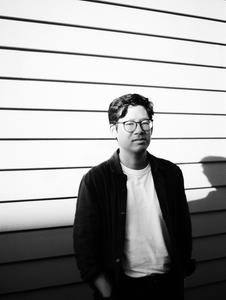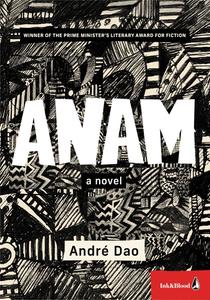
|
|
| photo: Leah Jing Mcintosh | |
André Dao is an author and researcher from Naarm/Melbourne, Australia. His debut novel, Anam (Kaya Press, May 20, 2025), won the Prime Minister's Literary Award for Fiction, the New South Wales Premier's Literary Award for New Writing, and was shortlisted for the Miles Franklin Literary Award and the Voss Literary Award. It blends memoir, fiction, family history, and philosophy in a saga of the Vietnamese diaspora. He is the co-founder of Behind the Wire, the award-winning oral history project documenting the stories of the adults and children who have been detained by the Australian government after seeking asylum in Australia.
Handsell readers your book in 30 words or less:
Moving from 1930s Hanoi through a series of never-ending wars and displacements to Saigon, Paris, Cambridge, and Melbourne, Anam is a novel about memory and inheritance, colonialism, home, and belonging.
On your nightstand now:
I've been thinking a lot about the experience of living in a time of crisis--indeed, of being on the precipice of a catastrophe that one can't quite see coming. Partly for that reason, I picked up Thomas Mann's The Magic Mountain--it seemed to me that this novel set in an exclusive health resort in the Alps, on the eve of the First World War, might speak to our times. I've also been reading Patrick Chamoiseau's brilliant, shape-shifting Texaco--I happened to have read a lot of Martinican writers last year (Frantz Fanon, Édouard Glissant, and Aimé Césaire) so it seemed a kind of natural progression to read one of their inheritors. Finally (I always have three or four books--at least--on the go), I've been reading Thuân's Chinatown, an incantatory, surreal monologue by a Vietnamese mother stuck on the Métro in Paris, caught in spirals of remembering and imagining the past.
Favorite book when you were a child:
Growing up in a Vietnamese-speaking household, I often felt like I discovered incredible, life-changing books on my own that no one else had really heard of--until I later found out that the book was a well-known classic. The Narnia books were a good example of that. But one of my favourites as a child had a reverse trajectory: I knew that Mark Twain was very famous, and assumed that his Personal Recollections of Joan of Arc, by the Sieur Louis de Conte was a classic like Tom Sawyer or Huckleberry Finn--but even today I struggle to find anyone who's heard of it, let alone read it.
Your top five authors:
Alexis Wright--her novels, from Carpentaria through to The Swan Book and most recently, Praiseworthy, have redefined what it means to write fiction on and about the Australian continent. In a totally different but parallel way, Viet Thanh Nguyen's body of work has opened a universe of doors for diasporic writing--scholarly, fictional, and memoiristic. Svetlana Alexievich's oral histories transformed what I thought oral history could be--so much so that she inspired a project I worked on for a number of years called Behind the Wire, which documented the lived experiences of people in Australia's immigration detention centres. Thanks in large part to Alexievich's work, we realized that the stories we were working on could be--and had to be--so much more than testimonies of suffering. Meanwhile, I am haunted by W.G. Sebald's melancholy. On E.L. Doctorow--see below.
Book you've faked reading:
The Arcades Project by Walter Benjamin--if you've ever picked up a physical copy of The Arcades Project you might understand why I haven't read it cover to cover. It's not just that it's a hefty tome, but it was never finished, so the published volume is really a posthumous collation of notes, organized haphazardly like an archive that's been rearranged by a sudden gust of wind. Still, I have taken a lot from wandering aimlessly through it, as one might have wandered through the arcades Benjamin describes--in fact, Anam more or less ends with a quote from Arcades--but I don't think I will ever comprehensively read it. But perhaps that's the point.
 Book you're an evangelist for:
Book you're an evangelist for:
The Man Who Loved Children by Christina Stead.
Book you've bought for the cover:
Gravity's Rainbow by Thomas Pynchon.
Book you hid from your parents:
I'm not sure that I actually ever hid any specific book from my parents. But there was a point at which my reading started to take me very far from my Catholic upbringing. So while books like Albert Camus' L'Étranger might have been lying around in plain sight, their contents--and the doubts they induced in me about my faith--weren't exactly up for discussion.
Book that changed your life:
The Book of Daniel by E.L. Doctorow. I studied The Book of Daniel at university and had never read anything remotely like it before: it combined the stylistic and theoretical pyrotechnics of the postmodern writers I was drawn to as an undergrad, with a sharp political edge and deep well of feeling. I ended up writing my honours thesis on it, and it was never far from my mind as I wrote Anam--which is also the story of a (grand)son trying to understand a family history entangled with political crimes, imprisonment, and the Cold War.
Favorite line from a book:
"To each his character, to each character his mask." --Aimé Césaire, A Tempest
When I'm not writing fiction, I'm a legal academic--so I am always fascinated by the resonances between law and literature. One such resonance is in the idea of the persona--the mask that a human being puts on (or has put on them) to play a character in a story, or that an individual wears to be able to appear before the law (which we call "legal personality"). I think both law and literature are haunted by the suspicion--always repressed--that perhaps there is, after all, nothing under the mask.
Five books you'll never part with:
Anna Burns, Milkman
Maria Tumarkin, Axiomatic
Brian Castro, Shanghai Dancing
James Joyce, Ulysses
Herman Melville, Bartleby the Scrivener
Book you most want to read again for the first time:
George Eliot, Middlemarch.

